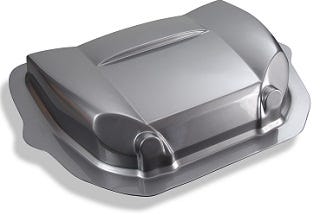Liquid thermoplastic resins processable with thermoset composite techniques
A family of liquid thermoplastic resins can be transformed into practical parts and components using processing technologies normally associated with thermoset resins, such as resin transfer molding (RTM). Arkema, the supplier of the materials, says application has commenced on a commercial basis in 2014, where their lightweight, cost-effective and recyclable nature is being exploited.
March 10, 2014

A family of liquid thermoplastic resins can be transformed into practical parts and components using processing technologies normally associated with thermoset resins, such as resin transfer molding (RTM). Arkema, the supplier of the materials, says application has commenced on a commercial basis in 2014, where their lightweight, cost-effective and recyclable nature is being exploited.
"The formulated resins are based on various monomers, oligomers, additives, catalysts and eventually fillers. In terms of chemistry, they are effectively considered as an acrylic resin," says Sébastien Taillemite, the product range's manager.
Launched under the Elium brand, the resins reportedly polymerize quickly and can be used to design structural parts as well as aesthetic elements in a number of applications from the automotive and transportation industries to wind power, athletic equipment and the building sector.
|
Liquid thermoplastics process on thermoset processing equipment. |
"In the automotive field, we are developing [body-in-white) structural parts and also exterior parts for trucks and buses," says Taillemite. "We are targeting 2-3 minutes cycle time for automotive using fast RTM and 20-30 minutes for bus and trucks parts using RTM Light." More can be learnt about the new products at the JEC Show in Paris which starts on March 11.
Composite parts made from Elium are reportedly 30-50% lighter than the same parts made from steel, but offer the same strength. The density of the composites ranges from 1.55 with carbon fiber (60% volume) to 1.9 with glass fiber (50% in volume).
When combined with Arkema's Luperox peroxide initiators, Elium can reportedly be molded into complex design forms for composite parts and perfectly blends with glass or carbon fibers. Besides RTM, the material is also compatible with infusion, and flex-molding processes, which reduces switching costs for processors. "We are also working on other processes, albeit we are still in the R&D stage at present," says Taillemite .
Unlike unsaturated polyesters, Elium resins do not contain styrene. And because of their thermoplastic properties, they can be used to design composite parts that are easily thermoformed and recyclable with comparable mechanical performance to epoxy parts.
"Mechanical performances of Elium composites are the same as epoxy composites, due to the use of fibers with a specific sizing allowing excellent matrix-to-fiber adhesion," says Taillemite. "Specific sizings exist both for carbon and glass fiber." Further, toughness, wet ageing and UV resistance of Elium composites are higher than for epoxy composites."
Parts made from Eliumcan be joined using welding and/or adhesive bonding. Arkema subsidiary AEC Polymers (Barp (Le), France) offers suitable adhesives.
Elium technology also reportedly reduces the cost of long staple fiber thermoplastic composite parts. Three factors reportedly contribute to its cost-effective advantage: the resins are easy to use in conventional thermoset resin processes, they process at room temperature, and the use of prepregs is not required.
You May Also Like



